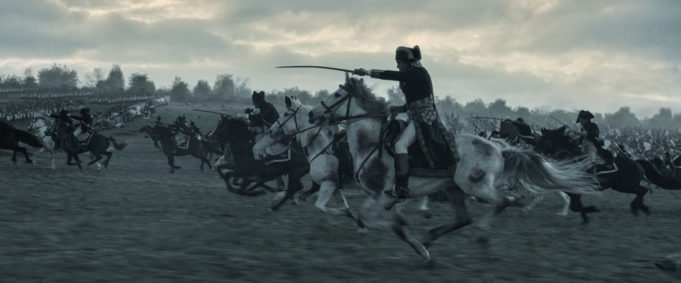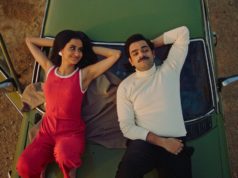Almost 100 years ago, Abel Gance made a movie about Napoleon Bonaparte. That was more than 100 years after the French conqueror’s death, but Bonaparte still cast so big a shadow that Gance felt he had to break film aesthetics to do his subject justice. In his 1927 epic Napoleon, he pioneered so many cinematic techniques that it astonished the most innovative French New Wave filmmakers decades later.
It’s a lot to ask an 85-year-old filmmaker to do something similar when he makes his own movie about the legendary conqueror. What I don’t think is too much is for that director to create something insightful that makes us see its subject in a new light or at least engages our attention. After all, 81-year-old Martin Scorsese succeeded on both counts with Killers of the Flower Moon. Despite some creative bursts, this is where Ridley Scott and his movie fail.
Let’s start with what works here. Napoleon offers two excellent combat sequences, one during the Battle of Toulon and the other during the Battle of Austerlitz. The latter shows just what made Napoleon (Joaquin Phoenix) a military genius, as the general directs his forces to deceive his Austrian and Russian enemies into thinking they’ve ambushed the French camp and then chase them across a frozen lake. This culminates in a cool shot of French cannons punching holes in the ice and consigning thousands of soldiers and horses to death in the frigid waters.
Napoleon’s first attempt to seize power is treated as bloody farce, with the politicians giving him and brother Lucien (Matthew Needham) a serious beating and chasing them out of the assembly building before the Bonapartes return with armed soldiers.
And Rupert Everett, as the Duke of Wellington, is cast starkly against type, and it works a treat.
Scott directed Phoenix to one of his greatest performances in Gladiator — to this day, I find uses in my daily life for the line “It vexes me. I’m terribly vexed.” Yet I’m roundly underwhelmed by Phoenix’s performance here, more than I ever have been by his acting. His Napoleon is a charmless lump who has CGI to make him look shorter. The film is supposed to rest on the relationship between him and Joséphine de Beauharnais (Vanessa Kirby), the aristocrat he marries for political purposes. David Scarpa’s script makes some vague indications that she has social skills that he lacks, but the movie doesn’t follow through on this plot. The marriage has about as much passion as the joyless sex that Napoleon and Joséphine have in a fruitless attempt to produce an heir. The film implies that Napoleon loses the Battle of Waterloo because he’s mourning her death from pneumonia, and it gives no emotional weight to the story. I prefer the explanation that he lost Waterloo because his terrible hemorrhoids kept him from mounting his horse and surveying the battlefield.
It’s surely not encouraging that Pablo Larraín’s El Conde — a Chilean black-and-white vampire movie that came out two months ago — stages the execution of Marie Antoinette more convincingly. The movie’s 157 minutes speed by all the highlights of Napoleon’s rise and fall without stopping to extract any deeper meaning from them. Scott loses the thread of the story detailing Napoleon’s dealings with Britain, Austria, Russia, and his friends, enemies, and frenemies within France. The story of this Corsican gunnery sergeant, a quintessential outsider who brought Europe’s kings to their knees, probably has something to tell us about today’s political landscape. Too bad Napoleon doesn’t find it.
Napoleon
Starring Joaquin Phoenix and Vanessa Kirby. Directed by Ridley Scott. Written by David Scarpa. Rated R.












